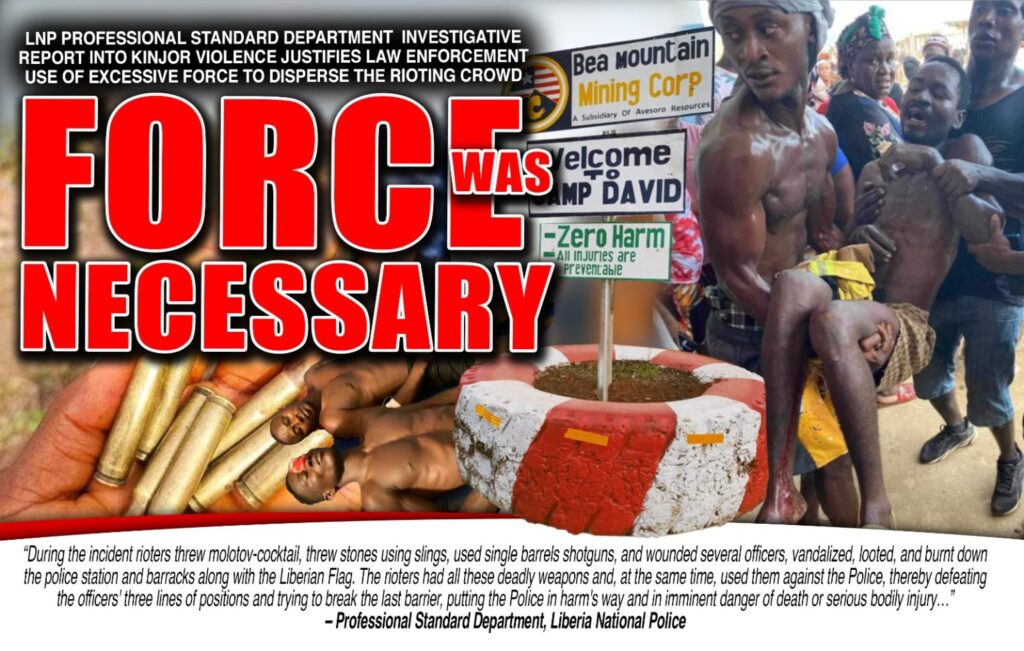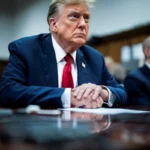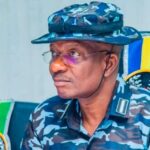
MONROVIA – An investigation conducted by the Professional Standard Department of the Liberian National Police into the February Kinjor demonstration has concluded that the police’s use of force to disperse rioters was necessary due to being attacked by violent demonstrators.
The Professional Standard Department recommends that “all the officers who admitted discharging their weapons, namely Chief Superintendent Clinton Morris, Superintendent Spencer Tamba, Chief Inspector Ezekiel J. Doe, and Chief Inspector Marcus C. Zorleh, are exonerated for discharging their assigned firearm for the fact that the agitating group who turned to rioters were throwing Molotov-cocktail, throwing stones, sticks, firing single-barrel shotguns, broke the officers’ last barricade which put the Police in direct harm’s way and imminent danger of death or serious bodily injury…”
Between February 27 and 29, deadly protests by residents of Grand Cape Mount County demanding the company to live up to its concession agreement rocked the Bea Mountain Mining Corporation (BMMC) area. The protesters, among other things, called for the removal of Debbah Allen as Country Manager of the Bea Mountain Mining Company, improvement of its employees’ healthcare, Welfare and provision of electricity for the locals.
The police investigation reported that in an effort to calm the tension and restore law and order, the police and the protesters clashed, resulting in the death of three persons and injury of 14 police officers with one believed to be as a result of a single- barrel gunshot wound.
In addition, the rioting led to the burning of the company’s properties including an excavator, a compactor, and a front loader machine as well as vandalization, looting, and burning down of the police station and barracks.
In its report, the Professional Standard Department of the LNP said at the start of the protest, its officers on the ground, with the help of the Grand Cape Mount County Senator Dabah M. Varpilah restored calm, and cleared the roadblocks leading to the company’s headquarters. However, on February 29, the protesters “aggressively” regrouped and attacked the police.
“During the incident rioters threw molotov-cocktail, threw stones using slings, used single barrels shotguns, and wounded several officers, vandalized, looted, and burnt down the police station and barracks along with the Liberian Flag. The rioters had all these deadly weapons and, at the same time, used them against the Police, thereby defeating the officers’ three lines of positions and trying to break the last barrier, putting the Police in harm’s way and in imminent danger of death or serious bodily injury,” said the Professional Standard Department of the LNP in its report.
The report justifies the use of lethal force based on imminent danger to life and bodily integrity, in accordance with international standards on the use of force by law enforcement officials.
“Potential lethal force is appropriate in circumstances in which there is a natural and imminent danger to human life or bodily integrity. The use of potentially deadly force must be a measure of last resort and thus could only be used when non-lethal means have been exhausted. Therefore, based on these analyses and facts, police action using lethal force was necessary.”
The Recommendations
The Department recommends exonerating officers who discharged and did not discharge their weapons and calls on the Government of Liberia to compensate affected parties, including bereaved families, injured officers and citizens, as well as officers who were victimized during the riot.
It also called on all police officers who were certified and issued firearms to take an annual proficiency test for recertification, in accordance with the Liberia National Police Use of Force Regulations.
This, the department said, is in line with Chapter 9 of the Regulation which states that the “Comprehensive Use of Force training shall be mandatory in basic training and in-service training programs for all police officers to ensure efficient and fair discharge of duties, which shall include, but not be limited to, annual firearms proficiency tests.”
Recommendation not in line with House’s
However, the Department’s recommendation conflicts with the House of Representatives’ findings and recommendations adopted by plenary on the 2nd of April this month. Following the incident, House Speaker Fonati Koffa set up a committee to investigate the violence.
The committee, among other things, called on the Liberia National Police to identify and hand over officers responsible for the fatal shootings at the Kinjor protest site for swift arrest and prosecution, demonstrating the government’s commitment to justice.



